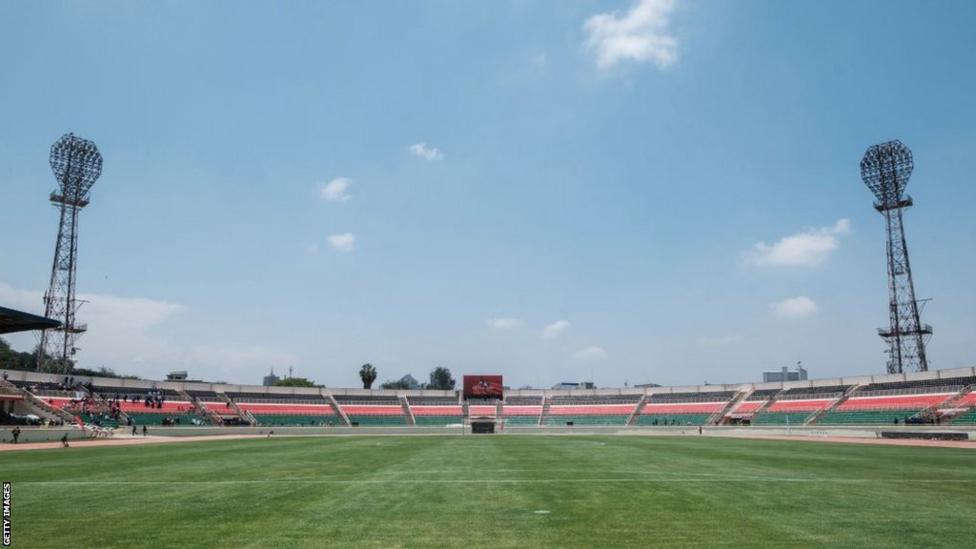When the joint East African bid from Kenya, Uganda and Tanzania won hosting rights for the 2027 Africa Cup of Nations (Afcon) on Wednesday, the emphasis quickly shifted to the tough expectations of the first staging of the tournament in the region since it visited Ethiopia in 1976.
Patrice Motsepe, president of the Confederation of African Football (Caf), praised the “deep commitment” to Afcon expressed by all three of the countries’ heads of state.
“We are very strict in terms of the requirements that we are placing on these countries, both in terms of freedom of movement in and out of the countries – and the support, infrastructure and co-operation,” said Motsepe, speaking in Cairo after announcing the result alongside Morocco’s appointment as 2025 hosts.
“We will be sending teams on an ongoing basis to evaluate the progress being made. The key is that we are absolutely determined to maintain the highest possible standards for African football.”
The Caf president said he would “hold their hand” and promised Afcon 2027 would be “a huge success”.
Morocco & East Africa to host 2025 and 2027 Afcons
Challenges ahead for Afcon hosts
Motsepe said he wants Afcon to match the standards of tournaments held by European body Uefa and South American counterparts Conmebol.
By Wednesday evening, the winners’ celebrations had been superseded by a focus on the challenges ahead, according to Rogers Byamukama, a board member of the Federation of Uganda Football Associations (Fufa).
“From now on, we are going to get our hands dirty and work alongside our counterparts in Kenya, Tanzania and Uganda to ensure the stadiums are ready by December 2025, which is a requirement,” Byamukama told the BBC World Service’s Newsday.
“It is a momentous occasion and we are excited. We are grateful for the opportunity and we look forward to hosting an extremely amazing extravaganza when the world will come to East Africa.”
Caf, which stripped Guinea of the 2025 tournament because of concerns over infrastructure and facilities, also considered bids for the 2027 finals from Egypt, Senegal and a joint entry from Botswana and Zambia, with Algeria withdrawing on the eve of the vote.
The governing body requires bids to propose two stadiums with capacity for 40,000 fans, two capable of accommodating 20,000 fans and two suitable for at least 15,000 supporters.
In Kenya, Sports Cabinet Secretary Ababu Namwamba announced plans last week to create a new 50,000-capacity stadium in Nairobi alongside improvements to the capital’s Nyayo National Stadium, the Kipchoge Keino Stadium in Eldoret and the Moi International Sports Centre in Kasarani, which hosted the World Athletics U20 Championships in 2021.
The country’s president, William Ruto, signed a $59.2m deal with a US foreign aid agency this month to buy electric buses to improve transport in Nairobi.
Kenya was awarded Afcon in 1996 but lost hosting rights because of a lack of readiness, suffering the same fate over the 2018 African Nations Championship as a result of “accumulated delays”.
Uganda’s Mandela National football stadium
Pictured in 2011 and originally opened in 1997, Uganda’s Mandela National Stadium is currently undergoing significant renovations
Ugandan First Lady and Cabinet Minister of Education and Sports, Janet Museveni, has said that the home of the national team, the Mandela National Stadium in Namboole, which originally closed for renovations in October 2019, will reopen on 30 November and meet Fifa stadium standards.
The country’s state minister for sports, Peter Ogwang, apologised in parliament after the national team played an Afcon 2023 qualifier against Tanzania in Egypt in March because of a lack of available venues in Uganda.
The Akii Bua Stadium in Lira and a new stadium in Hoima could also stage matches, while Tanzania’s venues will include the 60,000-capacity Benjamin Mkapa National Stadium and potentially the Azam Sports Complex, which are in Dar es Salaam.
“It is possible to have a stadium which is good enough, from scratch to completion, in two years,” said Byamukama, adding that the East African bid stood out because of strong transport links, including across the largest lake in Africa, Lake Victoria, which is in Tanzania and Uganda and borders Kenya.
When is the 2023 Afcon? Schedule, dates and draw
“All of the East African countries have national carriers that should help. It is less than an hour from Nairobi to Entebbe, Entebbe to Salaam and Salaam to Nairobi.
“Uganda uses the port of Mombasa and Salaam. There is a good road network.
“There were plans, even without Caf’s announcement, to extend the standard-gauge railway between Mombasa and Naivasha to Kampala by the end of 2025. The transport is the very best.”
The 2023 tournament will take place in Ivory Coast from 13 January until 11 February 2024. The draw will take place in Abidjan on 12 October at 1900 GMT.
